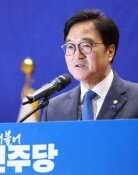Samsungs Outstanding Performance Under Lees Leadership
Samsungs Outstanding Performance Under Lees Leadership
Posted April. 23, 2008 05:12,
As our founder and early members successfully established a proud Samsung, despite trials and hardships, I will lead Samsung Group with ambition and a progressive spirit so as to help the business group take off again (Samsung Chairman Lee Kun-hees speech at his inaugural ceremony on December 1, 1987)
Samsung employees, 20 years ago, I promised that all the glory and benefit would be yours when Samsung Group became recognized as the worlds top business group. I am apologetic that I have not fulfilled my promise. (Lees statement at a press conference on April 22, 2008)
Lee Kun-hee succeeded Lee Byung-chull as Samsung Groups chairman in 1987 when he turned 45 and Samsungs founder passed away. In the wake of a special inquiry over corruption at the nations largest conglomerate, Lee decided to step down as chairman of the business group.
Despite the recent slush fund scandal, Samsung has emerged as the nations most respected business group under Lee Kun-hees 21-year-long leadership. Notably, Samsung Electronics, one of Samsung Groups major subsidiaries, has grown large enough to lead the worlds semiconductor industry.
While running the nations largest conglomerate, Lee has inspired a spirit of change and innovation in business circles and overall society, through New Management, the Theory of Sandwich, which poses that Koreas economic growth could be stalled since it lies between Japan and China, and Creative Management.
○ Samsungs Big Bang
Immediately after his inauguration as Samsungs chairman, Lee declared that he would run the business as if he was setting up a new business group. He emphasized self-organized management, technology, and human resources. Also, he offered a vision of nurturing Samsung as the worlds top-class firm for the 21 century, promising that Samsungs net profit would exceed 1 trillion won.
He has fulfilled most of his promises. Under his leadership, Samsung released a series of the worlds best products, including TFT-LCD, mobile phones, and computer monitor screens. According to leading global brand consultant Interbrand Corp., Samsung is the worlds 21st most valuable brand, estimated to be worth 16.9 billion dollars.
Moreover, Samsung outstripped Japans Sony, which had long been considered an impregnable electronics maker, in terms of market capitalization in 2002 and brand value in 2005.
Under Lees leadership, Samsung Groups annual sales jumped 8.9 times from 17 trillion won in 1987, when Lee assumed power, to 152 trillion won in 2006. Pre-tax profit soared a whopping 52.6 times from 270 billion won to 14.2 trillion won over the same period.
Samsung Groups market capitalization also skyrocketed from 1 trillion won to 140 trillion won, while exports surged 73.7 times from 900 million dollars to 66.3 billion dollars. The number of employees, including those located overseas, increased 1.6 times from 160,000 to 250,000, over the same period.
Samsung has taken an increasingly greater share of the nations economy. Samsungs sales account for 18 percent of Koreas GDP, its market capitalization claims 20 percent of total market capitalization of all firms listed on the Seoul bourses, and its exports make up 21 percent of the nations total exports.
○ Korean Economys Leader
Lees strong leadership has driven Samsungs stellar growth. For example, Lee declared that he would pursue New Management while ordering Samsung employees to change everything, but for their wives and children, in 1993. Samsung Group explained that Lee demanded New Management since he felt that the business group would collapse unless he shocked employees, who were complacent with their performance. He challenged established practices.
Lee also talked about small but strong nations. At a meeting of Samsung presidents in May 2001, Lee stressed, Small European nations such as the Netherlands and Finland could become one of the worlds strongest nations since some of their large corporations could successfully secure global competitiveness. Samsung also needed to have a strong sense of duty to support Koreas economy and make an all-out effort to show good performance.
In 2003, he talked about the significance of geniuses. He said, If Korea has three or four geniuses like Bill Gates, the nations per capita income could reach 20,000-30,000 dollars soon. We have to secure and retain geniuses who can take on the future regardless of changes in the world and market.
Lee began emphasizing design in 2005, saying, We have to create Samsung design, our own original design, which lets consumers know theyre buying Samsung products at first glance.
He initiated Creative Management in 2006, saying, We cannot produce creative products if we just stick to past practices or copy the products of competitors. Therefore, we need to nurture creativity so as to come up with brand new ideas.
It is not true that Lee has been blessed with only glory. As Samsungs share in the nations economy grew, some economists criticized that the conglomerates success was the outcome of emperors management and that Samsung Group seemed to work as a nation, not a business group.
Such anti-Samsung sentiment encouraged former Samsung attorney Kim Yong-chul to become a whistleblower, resulting in a special inquiry over the conglomerates slush fund and the unexpected resignation of the chairman.
Lee has not articulated his post-resignation plans. As he steps down as chairman and quits his other official posts, he will not make any official move in the near term. However, he is expected to play a role and deal with critical issues, including management succession plans, since he is still one of Samsungs biggest shareholders.
cha@donga.com







